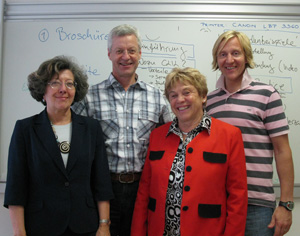Ideas, thoughts and reflections on the integration of languages and non-linguistic subjects:
Language Conscious Subject Teaching – A Way into Europe?
Contents put to use – Language skills developed – Prospects created
Learners learn a new language better when they think, express themselves and approach the language in a subject-oriented way. Meanwhile, this has also been proved scientifically.
It is now necessary to use this knowledge, especially for people who want to improve their prospects in Europe growing together. This article gives ideas how this can be achieved. The ideas stem from teaching and teacher training in different EU countries and aim at encouraging own developments.
What is the opinion of a high school graduate now studying or working and looking back at this kind of teaching? Dejan has experienced subject teaching at an upper secondary school in Bulgaria and, following to this, is studying in Hamburg.
In addition, The Central Agency for German Schools Abroad has produced a „Handbook of Methods in Subject Teaching in German“ as well as created a web page with practical examples. For more information, please see: www.dasan.de/dfu.
One learns to swim by swimming, a subject and a language by working with the subject and the language. Learners have to begin working with technical terminology as early as possible and as much as possible. Therefore, working without subject books in teaching is the wrong way. It is better to lead to subject books and texts. It is especially learners who are learning a new language that need a language model. To use subject texts receptive but also productive in teaching is a chance that should absolutely be given to learners as well as to teachers. Teachers should lead. They should know the differencies and learn how they can be dealt with.
- it is possible to work with languages in subject teaching and special instruction, also under unfavourable circumstances, such as, lack of time, subject-oriented teacher training, another mother tongue than German. The elements presented here are also applicable for other subjects and one’s own teaching.
- with the help of different methods (story board, texts, debates), subject knowledge, language and competences can be transmitted through teaching. More methods for beginners and advanced learners have been collected into a Handbook of Methods in Subject Teaching in German. They help learners to work with contents and technical terminology. Because the illustrations make them to a great extent self-explanatory, they can be used also by teachers who are non-native speakers of German.
Any comments, ideas or feedback on the topic and the webpage will be very welcome. Looking forward to hearing from you:

At the end of this contemplation there will be practical examples for language conscious subject teaching. They will show extracts/clips from teaching, teacher training and further education as well as development work and research.